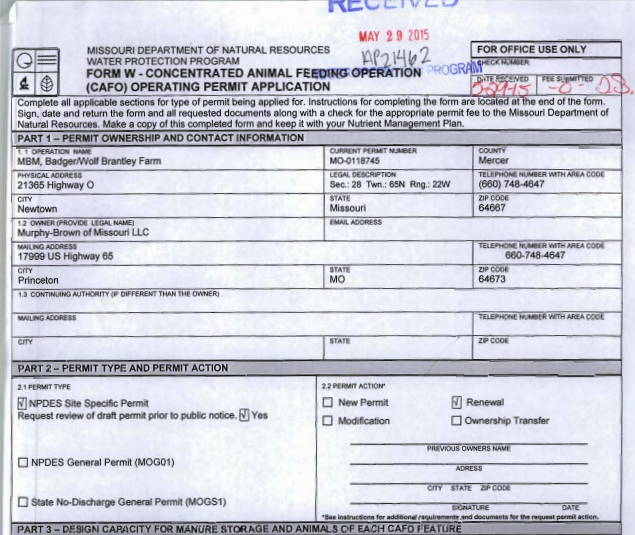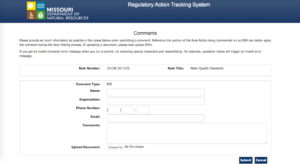Download this in PDF form, here.
Commenting on Permits

Government agencies evaluate permit applications and make regulations. As part of the evaluation process, government agencies often seek public input through holding “public comment periods.” A public comment period is a length of time during which a government agency will accept feedback and input from the public about a proposed permit or regulation. During this time frame, the government agency will accept written comments from individuals or organizations about a proposed action. Other government agencies may set different lengths of time for the public comment period. If (considering) pursuing litigation, it is beneficial and sometimes necessary to submit a public comment to establish standing.
Public comments that are submitted before the deadline go into the administrative record. Late comments may become irrelevant if submitted after the deadline passes. Furthermore, some courts have decided that if concerned residents do not raise a particular issue during the comment period, then the particular issue cannot be used to challenge the agency’s final decision on the permit or the rule. Therefore, preserve your issue by submitting a comment before the deadline. For more details about how to ensure your comment is complete, on-time, and appropriately considered, check out Section 4: Public Notice in MCE’s Advocacy Guide.
Missouri CAFOs must apply for permits under the Clean Water Act (CWA), whether or not they are authorized to discharge into waters of the state. The public comment period for a CWA permit is thirty (30) days; however, you may request an extension of the public comment period if you can demonstrate one of more of the following:
- There is significant public interest in the permit (renewal) draft
- There have been substantive changes to the permit that have not been adequately addressed or explained in the permit (renewal) draft
- The permit (renewal) draft itself is lengthy or otherwise complex enough to warrant more time for review
See an example of a (successful!) extension request here.
With regards to CWA permits, “Comments should be confined to the issues relating to the proposed action and permit(s) and the effect on water quality. The Department may not consider as relevant comments or objections to a permit based on issues outside the authority of the Clean Water Commission” (DNR WPP Permit Page). Keep this in mind when preparing your comment. If you focus on concerns like odor or noise, they may not be considered relevant to the CWA permit and detract from your comment letter. Instead, comment on water quality concerns like potential discharges, possible groundwater contamination, and nearby waterways.

Comment letters regarding Clean Water Act permits should be directed to the Missouri Department of Natural Resources (DNR) Water Protection Program (WPP). Comment letters are accepted via e-mail or fax and may be submitted in writing to the appropriate regional DNR office.The applicable contact name and mailing address can be found on the cover page of each draft permit. Contact information for the DNR WPP is listed below. Use this template for writing comments on CAFO permits and see a sample comment here.
Water Protection Program
P.O. Box 176
Jefferson City, MO 65102
573-751-1300
publicnoticenpdes@dnr.mo.gov
Commenting on Rules
State and federal agencies have the power to make regulatory rules, but they must follow an open public process to do so. There are multiple stages of the rulemaking process and the public generally has an opportunity to comment during the ‘Proposed Rule’ period.
Federal agencies must submit proposed rules to the Federal Register. They may engage the public in the preliminary stages of rulemaking by publishing an ‘Advance Notice of Proposed Rulemaking’ to the Federal Register. At this stage, the public may submit comments on the draft proposal. When an agency submits a ‘Notice of Proposed Rulemaking’ (NPRM) or ‘proposed rule’ then the formal public comment period begins. The agency will determine and specify the length of the comment period, which usually ranges from thirty to sixty (30-60) days. Agencies may consider late comments, but they are not required to. Members of the public may also submit an extension request on the comment period. You can learn more about the rulemaking process through the Federal Register here.
As a CAFO Watchdog, you should keep an eye out for NPRM from the Environmental Protection Agency (EPA), United States Department of Agriculture (USDA), and Agricultural Marketing Service (AMS) – these are some of the federal agencies which may regulate CAFO activities. See an example of a proposed rule that was published in the Federal Register by the AMS here (note it does not pertain specifically to CAFO activities).
The rulemaking process is similar for state agencies. All rules that are proposed by Missouri state agencies should be available in the Missouri Register. Some state agencies which make rules that may impact CAFOs include the Missouri Fertilizer Control Board (MoFCB), the Missouri Department of Agriculture (MDA) and the Department of Natural Resources. You can learn about proposed rulemaking by the DNR through its Regulatory Action Tracking System here. You are most likely to find rules which affect CAFO regulation under the Water Protection Program; however, the Air Pollution Control Program and other programs have amended rules which impact CAFOs. DNR provides an easy way to submit comments on proposed rules through Regulatory Action Tracking System which looks like this:

When you look at a proposed rule document in the Federal Register, it should provide contact information for an agency official and an address for submitting comments by mail. You can submit comments on rules proposed by federal agencies online at https://www.regulations.gov/help or through the Federal Register.
You may also use this template to submit a comment on proposed rules and see a sample comment that MCE submitted on a rule proposed by the USDA here. Note this comment does not pertain specifically to CAFO activities.
